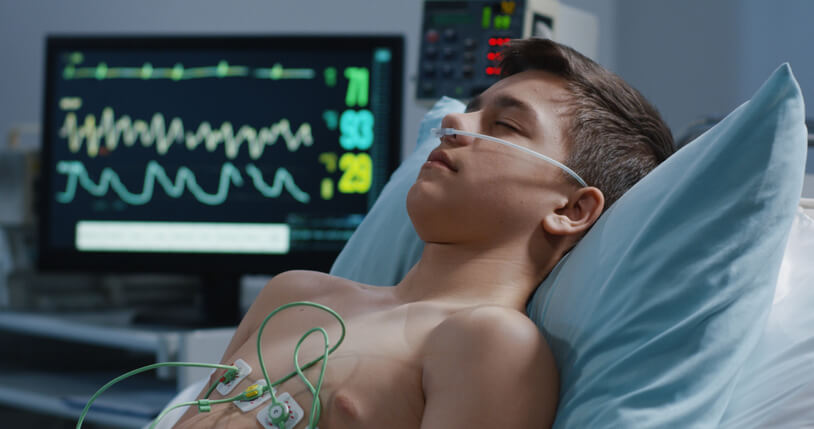
What Is “ALCAPA” & How Can We Be Proactive
By: Joy Stephenson-Laws, J.D., Founder
The following story is pretty much every parent’s nightmare.
John Thoms, a high school freshman, went to the doctor for a routine physical. Instead of receiving a clean bill of health, the young man was told that he had suffered a heart attack!
“After further testing, doctors were surprised he was even alive,” according to one report.
Turns out, Thoms had a heart condition called anomalous left coronary artery from the pulmonary artery (ALCAPA for short) which caused his heart attack.
What is ALCAPA?
To put it simply, it is a congenital (present at birth) heart defect.
“The left coronary artery (LCA), which carries blood to the heart muscle, begins from the pulmonary artery instead of the aorta,” (National Institutes of Health).
(Below is a diagram of a healthy heart).

“When this defect occurs, blood that is lacking in oxygen is carried to the heart muscle on the left side of the heart. Therefore, the heart muscle does not get enough oxygen. The tissue begins to die due to lack of oxygen. This can cause a heart attack in the baby.”
It’s really a miracle that the young man discussed in the story mentioned managed to live with this condition unnoticed for more than 14 years.
“Typically, ALCAPA is diagnosed during infancy. In rare cases, this defect is not diagnosed until someone is a child or adult,” reports the NIH.
“It's a birth defect that claims the lives of most babies during their first year of life if left untreated, according to childrenshospital.org,” the report says.
This heart defect must be treated with corrective surgery. Thoms underwent open-heart surgery. Luckily, the report says his condition is improving.
How can we be proactive?
Fortunately, this heart condition is pretty rare - reportedly occurring at an incidence of 1 in 300,000 live births or 0.25 to 0.5 percent of all congenital heart disease.
But this, of course, does not mean that ALCAPA can’t happen.
Although ALCAPA occurs when the baby’s heart is developing, this condition cannot be detected in pregnancy. It is important to know the signs and symptoms of ALCAPA which may include:
- Crying and sweating during feedings
- Poor feeding
- Irritability
- Pale skin
- Rapid breathing
- Signs of pain and distress in the baby (often mistaken for colic)
If your newborn baby is exhibiting any of these symptoms, it’s better to be safe than sorry and seek the advice of a competent healthcare professional. If the doctor suspects your baby has ALPACA, he or she may administer the following tests:
- Echocardiogram, which is basically an ultrasound of the heart
- Electrocardiogram, which measures the electrical activity of the heart. The electrical impulses of your heart create a waveform that doctors have correlated to healthy and unhealthy patterns.
- Chest x-ray
- MRI
- Cardiac catheterization, which involves a catheter being inserted into a large blood vessel that leads to the heart. The pressure and the blood flow in the heart is measured.
Be proactive by having a healthy pregnancy.
We don’t always know what may cause a birth defect such as ALCAPA. Sometimes it is may just be a case of bad luck. But what we can do as prospective parents is do what we can to have as healthy a pregnancy as possible. That way we decrease the likelihood of having birth defects and other issues that may occur in pregnancy.
It is very important for pregnant women to be proactive by being mindful of teratogens. These are agents, such as infections, chemicals and drugs, that may cause issues with the development of an embryo or fetus.
(Read here to learn about toxic chemicals that could be lurking in your home. And if you are pregnant or planning to be, talk to your doctor about any supplements or medications you take, including acetaminophen).
And for tips on good nutrition during pregnancy, read here.
Enjoy your healthy life!
The pH professional health care team includes recognized experts from a variety of health care and related disciplines, including physicians, attorneys, nutritionists, nurses and certified fitness instructors. This team also includes the members of the pH Medical Advisory Board, which constantly monitors all pH programs, products and services. To learn more about the pH Medical Advisory Board, click here.







